Logistics sector is fast emerging as one of the top industry sectors in job creation in India. According to a recent Report from TeamLease, Logistics sector will create employment for 3 million people by 2022. In this context, we spoke with Capt. T. S. Ramanujam, CEO, Logistics Skill Council (LSC) to know more about their preparedness to skill people for these jobs and learn about the emerging job roles. This Skill Story captures the key elements of how LSC is powering the sector and its sub-sectors with skilled human resources. Let’s read on…
Q: How is LSC addressing the need for skilled human resources in the Logistics sector?
A: To begin with, let us look at the key sub-sectors that form a part of the Logistics industry. LSC works with various stakeholder companies that are engaged in logistics activity in these sub-sectors. It includes micro, small, medium and large enterprises of which 98% is privately owned. Following sub-sectors are fuelling the growth of the industry:
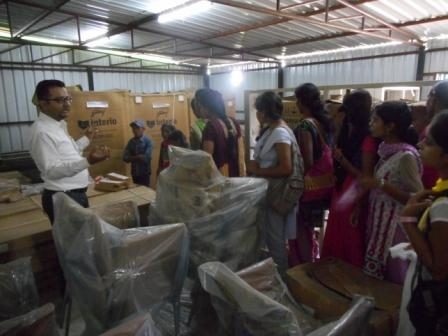 Warehousing, which includes Storage and Tertiary Packaging: Packaging is of two types; Branded Packaging of products and Tertiary Packaging done during transit to prevent goods from getting damaged. Tertiary Packaging is a key element of Logistics sector.
Warehousing, which includes Storage and Tertiary Packaging: Packaging is of two types; Branded Packaging of products and Tertiary Packaging done during transit to prevent goods from getting damaged. Tertiary Packaging is a key element of Logistics sector.
Land Transportation: This includes Commercial Vehicle Drivers for shipping cargo. Government is taking initiatives to promote Driver Training and with the new Roadway Bill will facilitate this.
Cold Chain Services: Cold Chain logistics is important to ensure retention of product quality from ‘farm to fork’. Maintenance of stringent environmental conditions and ensuring the maintenance of the cold storages to do so are important job roles we train candidates on.
Courier and Express: This is a Sector which has witnessed a sustained double digit growth throughout and has sizeable employment potential. Many Courier Companies are also doing the last mile delivery and hence have a connect with E-Commerce.
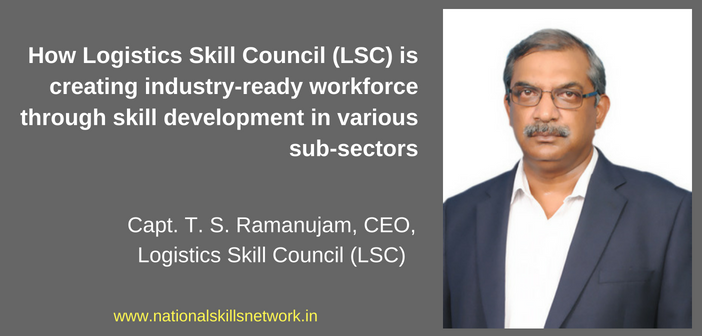
E Commerce: This is a boom sector and provides substantial employment to the school drop out category especially in last mile delivery jobs. This is also a sub-sector that promotes entrepreneurship by way of running fulfilment centres managing the hyperlocal end to end solution.
Port Terminals, Inland Container Depots and Container Freight Stations: Given the long coastline and the multitude of Ports that dot the coast, and the Governments thrust by way of the Sagarmala Program and other policy announcements like cabotage relaxation, the maritime sector has got a boost. This will create a downstream demand for jobs in the Port User Community.
Air Cargo: Rapid growth of E-Commerce and Express industry along with Policy pronouncements for improvement in Regional Connectivity has boosted the Air Cargo sector.
Freight Forwarding, EXIM and Customs: Digitisation and simplification of rules have resulted in ease of doing business. Job roles have also tended to mingle and merge necessitating candidates to multitask.
We want to position Logistics as a preferred sector for employment. With the investments happening in this sector, the time is ripe for youth to take up a profession in Logistics and move up the career ladder to become a skilled and professional Logistician. Capt. T. S. Ramanujam
We also work with some specialised sub- sectors in Logistics such as:
Liquid Logistics: There are mandatory requirements in this sector and skilled workforce is needed as it involves handling and transportation of hazardous goods.
Supply Chain- In-Plant Logistics: Logistics is integral to all manufacturing companies that includes inbound supply chain, in-plant logistics and outbound supply chain. In-Plant Logistics services customised to the needs of the manufacturer is essential.
Inland waterways: Govt of India has declared the Rivers as National Waterways. Substantial work is ongoing in ensuring the National Waterways are made navigable and carry cargo especially for carriage of commodities. Skilled manpower for manning these vessels will be the key need.
Rail Logistics: This is a recent subsector that got added and LSC would be training candidates for the job roles of Loco Driver, Loco/ Wagon and Siding Maintenance.
The Logistics Sector in India is a 150 Bn $ industry, providing employment to about 12 million people. The Logistics costc is about 14% to the GDP, which is much higher than the average of 6 to 8% in European Countries. Various inefficiencies such as wastage and delays in transportation etc contribute about 6 % which needs to be eliminated by bringing about better efficiencies.
Q: What are some the initiatives for skilling and what is top priority on the agenda?
A: Logistics industry has been evolving at a fast pace but it has remained unstructured and unorganized. Hence, there is a need to consolidate and structure it for fulfilling the talent needs. Skilling is of high priority, more so because this sector has not had the benefit of any structured training so far. Most training has been in-house and many employees are hired on the basis of past experience. This has given scope for inefficient practices, low productivity and lack of professional standards.
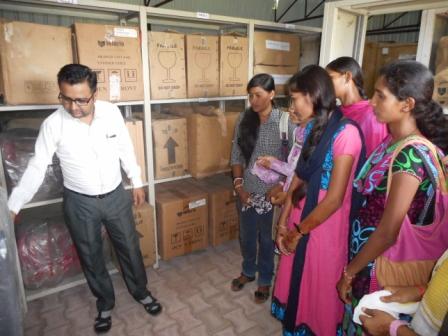 Going by the mandate, as an apex body for skilling the Logistics Sector, we have identified areas to work on and prioritized our initiatives that are aligned with various schemes from the government. This includes, developing course curriculum in the form of Qualification Packs (QPs) and National Occupational Standards (NOS) for various job roles, course content and training methodology. Demand aggregation and facilitation of employment is another key thrust area for LSC.
Going by the mandate, as an apex body for skilling the Logistics Sector, we have identified areas to work on and prioritized our initiatives that are aligned with various schemes from the government. This includes, developing course curriculum in the form of Qualification Packs (QPs) and National Occupational Standards (NOS) for various job roles, course content and training methodology. Demand aggregation and facilitation of employment is another key thrust area for LSC.
This sector has been non-aspirational, largely due to lack of career progression. We have built an occupational map which has defined career progression and also the possibility of lateral mobility by rationalizing the QPs. We also monitor training delivery by ensuring quality and consistency. We have also launched a placement cell and placement portal.
Key facts and achievements of LSC
- We had to build the training ecosystem from scratch. When we started in 2015, we had no trainers. Now we have a database of 1340 lead trainers; 940 of them have been certified. Now, we also have 305 trained assessors.
- With regard to Recognition of Prior Learning (RPL), in phase1 , about 40000 odd candidates have been certified through RPL 4. We are ready to launch phase 2 of RPL 4 and we know the areas we have to improve upon.
Q: How are you creating awareness about logistics as a lucrative sector for employment?
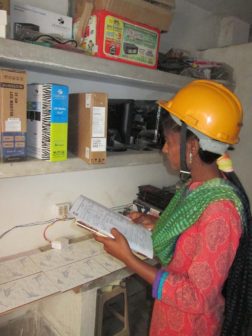 A: There is a lack of awareness about Logisitics among many stakeholders. Contrary to the popular perception, Logistics is not just transport. It has many other aspects and there is a huge potential for education and training to meet the job requirements both in urban and rural areas. Besides, we also need to convey the value of trained manpower to the industry for better productivity. Trained manpower will ensure a premium in skilling, as is happening in the case of Reach Truck Operators. Government help is needed to provide temporary accommodation for atleast 3 months for migrant workers i.e. till the time they settle down in a new place and this will partially defray the high cost of living in the metros.
A: There is a lack of awareness about Logisitics among many stakeholders. Contrary to the popular perception, Logistics is not just transport. It has many other aspects and there is a huge potential for education and training to meet the job requirements both in urban and rural areas. Besides, we also need to convey the value of trained manpower to the industry for better productivity. Trained manpower will ensure a premium in skilling, as is happening in the case of Reach Truck Operators. Government help is needed to provide temporary accommodation for atleast 3 months for migrant workers i.e. till the time they settle down in a new place and this will partially defray the high cost of living in the metros.
Q: What is the current focus on training of trainers and industry affiliations?
A: LSC has 325 affiliated training partners and more than 700 training centres across India. However we need to improve our presence in the North-East. Since this sector has not had the benefit of structured training, we do face a shortage in qualified trainers. Hence, when trainers come from the industry, we make sure they are trained in pedagogic skils for effective training delivery. In our assessments too, we’re taken ample care to ensure only candidates with right qualifications can clear the assessments.
The Industry has come forward in a big way to set up Pradhan Mantri Kaushal Kendras (PMKK) The Express Industry Council of India is setting up three PMKK’s in Mumbai, Bangalore and Chennai. This has been approved by NSDC. And we will soon have a centre for Maritime Logistics run by the Symbiosis Open University, off JNPT in Mumbai.
We are concentrating on high-demand job roles like Commercial Cargo Drivers. Earlier, this job role was under the purview of Automobile Skill Council. Now both ASDC and LSC along with NSDC will be creating the SOPs to operate the Driver Training Institutes. We are encouraging industry to set up private training institutes to meet the demand for skilled cargo drivers and ensure that drivers are well-trained in safety and incentivised.
Q: Tell us about the impact of latest technologies on the future of logistics
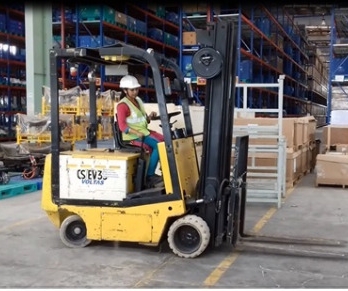 A: With the advent of technology, some companies are already dealing with Machine Learning and Artificial Intelligence to optimise logistics. New job roles which will incorporate technology from the domain of Informatics and Mechatronics are gaining prominence. We want to focus on practical training to prepare workforce for efficiency, higher productivity and cut down on wastage by incorporating these technologies. Moreover, there is a special move to include women who can take up roles like packaging in an otherwise male-dominated industry.
A: With the advent of technology, some companies are already dealing with Machine Learning and Artificial Intelligence to optimise logistics. New job roles which will incorporate technology from the domain of Informatics and Mechatronics are gaining prominence. We want to focus on practical training to prepare workforce for efficiency, higher productivity and cut down on wastage by incorporating these technologies. Moreover, there is a special move to include women who can take up roles like packaging in an otherwise male-dominated industry.
Q: What are your plans for aligning academic institutions and promoting apprenticeships
A: There are very few formal courses on Logistics in India. Today, there are 4 colleges offering B.Voc Degree program; we have supported them with curriculum design and industry-relevant content. In a recent meeting with MHRD, we’ve also discussed options to include Logistics as a subject in B.A and B.Com courses and tie it up apprenticeships. We intend creating structured Career Pathways through Apprenticeship i.e. Trade Apprenticeship after 12th, Diploma Apprenticeship for students pursuing education in a Polytechnic and Degree Apprenticeship for Graduates.
Disclaimer: The content (text, pictures, videos, slideshows and audio) are provided and approved for publishing by the client who is featured in this article. National Skills Network – NSN is not responsible for any copyright or related issues with any such type of content.













Comments 1